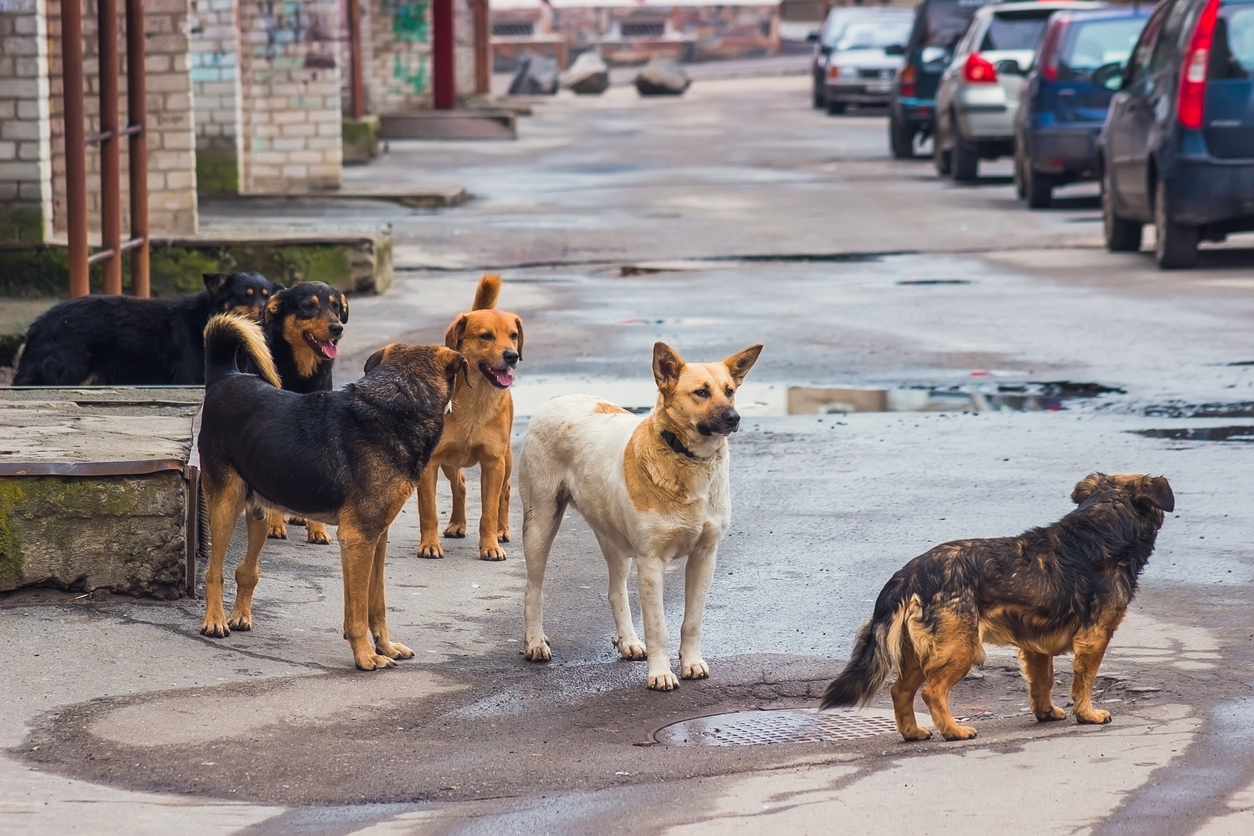The Animal Birth Control programme will continue without interruption to check the increase in the population of stray dogs.
Published Jul 13, 2025 | 8:00 PM ⚊ Updated Jul 13, 2025 | 8:00 PM

Stray dogs on a street. (iStock)
Synopsis: Out of the estimated 2.7 lakh stray dogs in the city, this food distribution programme focuses only on around 4,000 dogs identified as being in critical need due to a lack of food. Targeting specific locations at the ward level allows for greater effectiveness. In most wards under BBMP’s zones, approximately 70% of the sterilisation targets have already been achieved.
Feeding stray dogs will prevent them from forming packs and attacking people, the BBMP’s Animal Husbandry Department said in a statement, adding it will continue the Animal Birth Control (ABC) programme.
The BBMP issued the statement to explain its planned move to feed community dogs. The civic body said it had fed a specified number of dogs last year as well.
The Animal Husbandry Department has now invited tenders for providing fresh, balanced food to dogs at designated feeding locations. The BBMP said the decision was made after reviewing the pros and cons of the proposal to feed dogs.
Though it had fed dogs last year, “the current initiative is an improvement and has also become a legal necessity under the Animal Birth Control Rules, 2023, framed by the Government of India”, it said.
The feeding points will be identified and monitored by the Assistant Directors of each zone, and food will be provided by the selected service provider/s through a tendering process.
Capturing fearful or aggressive dogs is a significant challenge. In many areas, a lack of access to food drives dogs to form packs, increasing incidents of dog bites. This issue can be mitigated through planned food distribution in different locations of the same area.
Simplified dog capture operations: Easier capture facilitates better implementation of sterilisation and anti-rabies vaccination programmes.
Reduced aggressive behaviour: With designated feeding points, there is less competition and territorial aggression among dogs.
BBMP’s mass vaccination drive is already in progress. Providing a balanced diet helps improve the overall health of the dogs, reducing the risk of zoonotic diseases (those transmitted from animals to humans).
This initiative also aligns with the broader goal of public health protection through animal health programmes aimed at controlling rabies.
Out of the estimated 2.7 lakh stray dogs in the city, this food distribution programme focuses only on around 4,000 dogs identified as being in critical need due to a lack of food.
Targeting specific locations at the ward level allows for greater effectiveness. In most wards under BBMP’s zones, approximately 70% of the sterilisation targets have already been achieved.
However, a few wards continue to face challenges in capturing dogs or reducing their population. These areas have been prioritized for focused food distribution to help stabilize the situation.
In addition, the Animal Birth Control (ABC) programme will continue without interruption to check the increase in the population of stray dogs. In areas not covered by the BBMP Feeding programme, feeding will be managed by committed animal welfare volunteers who are already actively working on the ground.
The total project cost is ₹2.88 crore. Under this initiative, 100 feeding spots are set up in each zone, providing food once a day for 365 days to 500 dogs per zone. As per the calculations, the daily cost per dog is ₹19 (excluding taxes), which includes:
₹8: For daily transportation, food supply, and site sanitation
₹11: For the cost of the food itself
These details were already published in the media a few weeks ago. Hence, this should not be considered a new or revised estimate.
The BBMP will continue to supervise and implement sterilisation, vaccination, and feeding of street dogs, ensuring quality and success metrics. Based on out outcome of the street dog feeding programme, the final annual review will be made and a decision regarding the
The continuation or modification of the project is considered in the subsequent year.
Relocating street dogs or housing them in pounds is legally prohibited. The Animal Birth Control (ABC) guidelines issued by the Animal Welfare Board of India (AWBI) provide a detailed explanation regarding this.
To increase the rate of sterilisation surgeries, this project is being implemented as part of BBMP’s broader priority of dog population control through humane methods.
The BBMP’s dog feeding initiative is based on the revised Animal Birth Control guidelines issued by the AWBI. The guidelines contain specific recommendations for animal welfare, which are being strictly followed in implementation.
Since dogs are carnivorous animals, a balanced diet including protein is essential.
Accordingly, the food provided includes boiled chicken along with rice and vegetables to ensure nutritional adequacy.
The ingredients listed in the tender only include the components of the meal. There is no mention of “biryani” or any such term. The food is designed to be appropriate, safe, and nutritionally balanced for the dogs. This meal plan has been developed based on expert veterinary advice and insights gained from a pilot project conducted last year.
